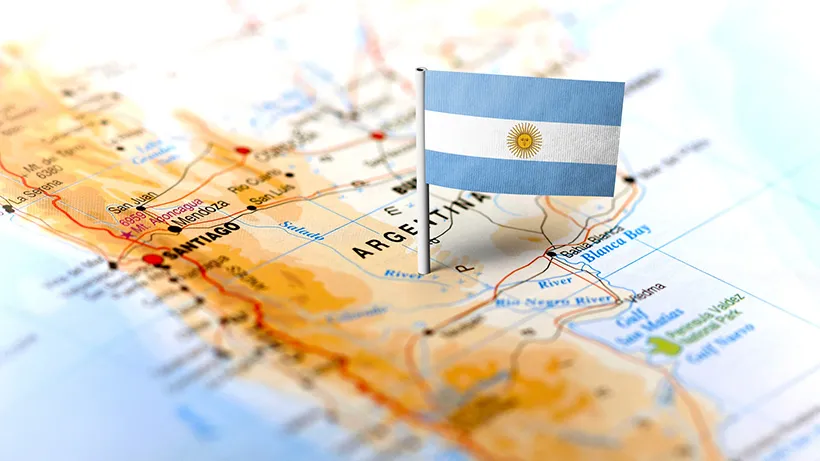Countries and Markets 1/2019: Financial and political uncertainty is increasing – export credit agencies play a more significant role in ensuring the preconditions for export

According to Finnvera’s half-year report published in August, demand for export financing grew during the first half of the year when compared to last year. Demand growth is a sign of both the active approach of Finnish export companies and increasing uncertainty in the world economy. Typically, the role of export credit agencies in financing export transactions becomes more significant when financial and political uncertainties increase. The first Countries and Markets overview discusses Argentina, a country in distress, and, on the other hand, Brazil, China, Vietnam and Bangladesh, countries that are very interesting from the export point of view.
At the end of 2018, altogether 11 per cent of Finnvera’s valid exposure and binding offers is associated with South and Central America, and more than 70 per cent of Finnvera’s exposure in the pulp and paper sector is related to Latin America. The largest country exposures in the region are Brazil, Chile and Uruguay.
Map from Finnvera's Annual Review 2018.
Argentina’s distress drove foreign providers of financing into panic
Roughly four years ago, Argentina started to open up again to foreign investments and financing. The country was an interesting growth market for Finnish exporters, too, especially in the energy sector and telecommunications. In addition, potential demand was emerging in infrastructure development, the mining industry, wood processing, and education exports. Finnvera was one of the first Western export credit agencies to grant export credit guarantees and export credits for export projects involving Argentina.
As Argentina’s economic outlook declined, the International Monetary Fund (IMF) granted financing to the country in summer 2018, with the largest financing arrangement in the IMF’s history. As the presidential election of autumn 2019 is approaching, political uncertainty has led to a collapse in trust in the country’s economy. The return of Peronists to power has begun to look like a real possibility.
“Markets have not been patient enough to wait for the necessary economic rationalisation reforms to be carried out. In the recent presidential primary, Alberto Fernández, the candidate of the left-wing populist Peronist party, gained a surprisingly clear win over the reigning President Mauricio Macri, whose popularity has declined as economic challenges have continued. Markets reacted strongly to this, and the value of the peso dropped to half in a short period of time, accelerating the inflation further. It is feared that the country will return to its former closed and populist politics. Even before this, Argentina has caused credit losses to international investors and it has been necessary to rearrange the country’s debts several times,” says Regional Manager Mika Relander, who specialises in Latin America.
Argentina’s situation also influences the opportunities of Finnish export companies in the country. Sooner or later, the state’s declining solvency will also affect enterprises as efforts are made to curb currency outflow by introducing currency transfer restrictions that complicate trade and payment of debts. Finnvera monitors the country’s situation closely and does not currently grant new long-term export credit guarantees for exports to Argentina. Guaranteeing short-term letters of credit is still possible, based on case-by-case consideration.
“Hopes were pinned on the normalisation of the Argentinian economy although there has always been a certain political risk. It has been difficult to atone for old sins, and international providers of financing have long memories. The country’s current administration has mainly done the right things, but has the pace of renewal been too slow? However, if the administration had carried out renewals at a faster pace, this could have led to equal instability and problems. Now, the results of the presidential primary triggered fears and perhaps even caused overreactions among external providers of financing, which may easily lead to sources of financing drying up. Furthermore, the currency transfer restrictions certainly do not increase the trust of the markets during the wait for the new administration,” notes Relander.
No quick solution is in sight. The first round of the presidential election will be held in October and, if the election goes to the second round, the result will only be clear in late November. At least until that, the country’s economy will continue living in uncertainty.
The export credit agencies of the OECD countries categorise countries on a scale of 0 to 7. In the recent OECD meeting, Argentina’s category was dropped to the lowest solvency level of 7. This affects the minimum guarantee premium, for instance.
Brazil is characterised by populism, but the economy is developing favourably
In Finland, the country that has recently made headlines more often than Argentina is Brazil, where President Bolsonaro’s right-wing populist administration is in power. Thanks to the pulp and paper industry, Brazil has been one of Finnvera’s largest country exposures for a long time.
“Brazil is a large market. Its institutions are considered to be strong, even though political scandals have brought economic growth to a standstill. On the other hand, the administration has managed to encourage development that is favourable to markets, and it seems that the country’s economy is finally returning to growth. The repayment of Finnvera’s financing has gone well,” says Relander.
The flipside of the coin is the president’s populist style, which increases volatility in the markets and nearly jeopardised the free trade agreement between the EU and Mercosur that required decades of hard work to come true. According to Relander, there is still a long round of ratifications ahead before the agreement enters to force.
Other countries – growth continues in Asia
China has potential – the trade war and declining economic growth clouds the sky
Despite the relatively negative news related to the trade war, China is still a strong potential market. Although the Chinese economy has taken a slight downward turn, Finnish enterprises say they are doing reasonably well in the Chinese market and believe the country possesses significant growth potential for their business operations. Especially in cleantech and ICT, the outlook is good but challenging and the sectors require local market insight and long-term work in building client relationships. The new law on foreign investments that enters into force at the beginning of next year may also open up new opportunities – but also bring new obligations. (link to Mika’s interview) China is moving from industrial manufacturing to creating its own innovations, and productionquality requirements have risen. The country needs Western equipment and machinery, which offers export opportunities for Finnish enterprises, too. As these are extensive investments, it is likely that the need for long-term financing will increase and, as a result, there will also be more demand for Finnvera’s export credit guarantees.
The country’s strong financing sector and public support for financing have kept demand for foreign currency financing very moderate. Demand will probably grow gradually when the country’s financing regulation becomes more open, but it is likely that this growth will also require an active approach from the providers of financing. Finnvera may consider granting financing and export credit guarantees for exports to China in corporate, bank and public sectors, provided that the buyer risk can be analysed. The availability of Chinese enterprises’ financial statements information has improved somewhat.
“In China, there is not automatically demand for foreign financing, unlike in Western countries, where different modes of export financing are used as part of everyday business operations and where buyer enterprises often ask the exporter to provide a financing arrangement. The benefits of export financing supported with export credit guarantees (ECA financing) must be explained to the Chinese. If a Finnish exporter offers financing, it may well give them a competitive advantage. Long-term, competitively priced financing, especially with regard to foreign currency credit, is not as generally available in China as short-term financing. From the point of view of Chinese enterprises, Western financial statements obligations and environmental and social impact assessments required by export credit guarantee financing may seem cumbersome. However, these assessment processes could be useful for Chinese buyers as the transparency of business operations increases an enterprise’s attractiveness in the international market. In China, such sectors could be metal processing, mining and process industries, for instance,” says Regional Manager Mika Relander, who monitors the situation in China as well as in Latin America.
The Vietnamese economy continues to grow
The Vietnamese economy is predicted to continue growing by more than six per cent a year in the next few years despite the slowing down of the world economy and trade. Economic growth is boosted by an increase in exports, especially in the strong industrial manufacturing sector, which has also received direct foreign investments, and the positive development of the service sector, particularly tourism.
In recent years, international enterprises have made investments in Vietnam and transferred their production from China to this lower-cost country that can offer not only a good location but also the benefits yielded by the nearly 20 free trade agreements it has signed. As the trade war between China and the United States becomes fiercer, Vietnam is making efforts to attract industrial production from China and other foreign countries.
The free trade agreement signed by the EU and Vietnam will probably enter into force in early 2020. The agreement will benefit Finnish enterprises, too. More information about the agreement can be found on the website of the Ministry for Foreign Affairs. Finnvera has good opportunities to promote Finnish exports to Vietnam by granting export credit guarantees to Finnish exporters and banks involved in the financing of export transactions and by participating in the arrangement of working capital and guarantees for SMEs’ export transactions.
Interest in Bangladesh is increasing
For a long time, trade between Finland and Bangladesh has shown a strong surplus for Bangladesh. In recent years, Finnish export companies’ interest in Bangladesh has increased, which could also have been seen in demand for Finnvera’s services. Finnvera’s liabilities for guarantees have been close to EUR 100 million for several years. Finnvera has accepted letter of credit risks with regard to many private banks. Long payment term financing to Finnish export companies’ Bangladesh buyers has also been supported with export credit guarantees.
Bangladesh, a country with a population of 167 million, is dependent on textile exports and agriculture. For a long time, the country’s annual economic growth has exceeded six per cent. Economic stability has increased, and inflation has remained low. However, in terms of national product, Bangladesh is still a lower-middle-income country. Investments have been made in improvements in energy production, while other infrastructure improvements are sorely needed to maintain economic growth.
Bangladesh’s problems include the large share of poor population, environmental and social challenges and vulnerability to natural disasters. Political juxtaposition and corruption impair the business operating environment. In the World Bank’s Doing Business 2019 report, Bangladesh was ranked 176 (out of 190 countries) in the business environment comparison. The poor working conditions in the country’s textile industry are under special monitoring by the EU.
Further information:
Finnvera’s Country and Environmental Risk Management Team monitors the financial and political situation. Read more about Finnvera's country classification and country policies on the country classification map.
Next Countries and markets review will be published at the end of the year 2019.
